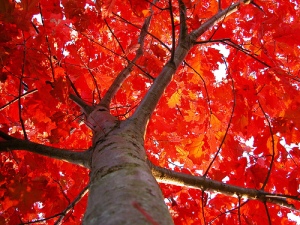“An Oak in aged strength…” like the wooden walls of Old England was raised against the would-be conquering Spanish Armada. The English Oak, Quercus robur, or “Hard Oak” has been conjoined with English history for so long that they wanted to claim all further discoveries of other species as just another variant of their own native tree.
For years, my own shipments of our North American native were viewed as little more than a choice selection of England’s vaunted domestic variety. It took confirmation from Carl Linnaeus that mine were distinctly different and entirely new introductions. Most notably my shipments included Quercus rubra. Red Oak. And today, the color of England’s fall is made much more brilliant by this addition to the trade.
Not only Q. rubra but also Q. phellos, Q. alba, Q. velutina, and Q.heterophylla (my own hybrid between rubra and phellos) were standouts in the shipments that traveled from my garden in Philadelphia to the estates of the landed gentry in Southern England. It was through my efforts that the British Isle was reforested after the massive logging efforts necessitated by the construction of Britain’s Imperial Fleet.
The mists and the myths of time bring many stories of the naming of this ancient genus. The Romans first named it “Quercus” because it was through asking questions of this tree that the pantheon of pagan gods could be heard. Our word “query” derives from the superstition that the Oak tree was a conduit through which the gods foretold the future of men.
To the even older Celts that inhabited the darker world of northern Britain and Europe, an Oak was the most sacred member of the forest. It represented the axis mundi (center of the universe) and was given the name “Daur” from which our own word door has been taken. The roots of this tree were literally seen as a door into the Otherworld of spirituality. The word Druid is actually a combination of the Celtic words for oak and seeing. A Druid was the priestly seer who knew the tree magic and stood as the guardian of the door to the Otherworld.
Today, we take such superstitions as a child understands a bedtime story: they are notions that strike somewhere between our real hearing and sight and the mind’s eye that opens after sleep becomes dream. My majestic Oaks are nothing of the kind. They are iron-hard things that stand as sentinels marking the boundaries of a human age. They are proud and ceaseless in their service to our God and His nature. They are to be treasured and spread as thickly across this planet as it is within our power to plant. All of them. However many Carl can name, I can deliver.
